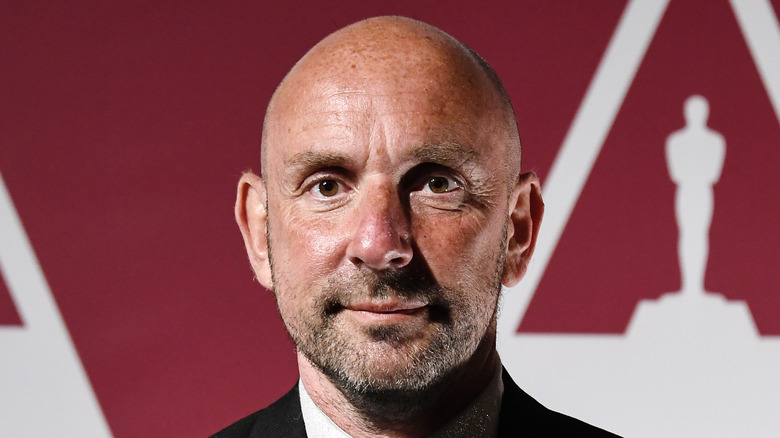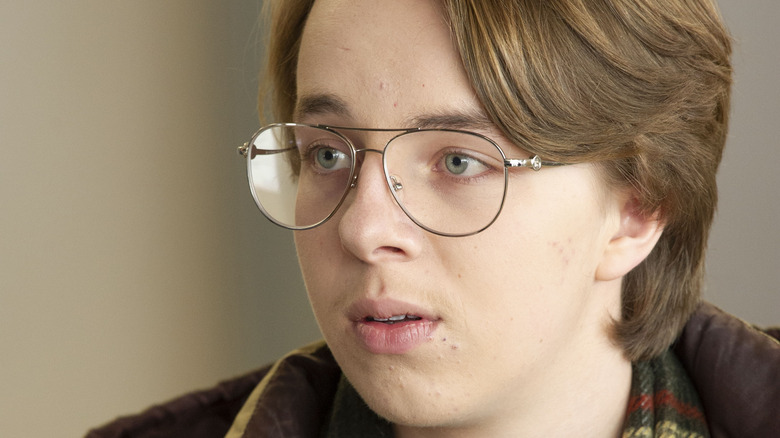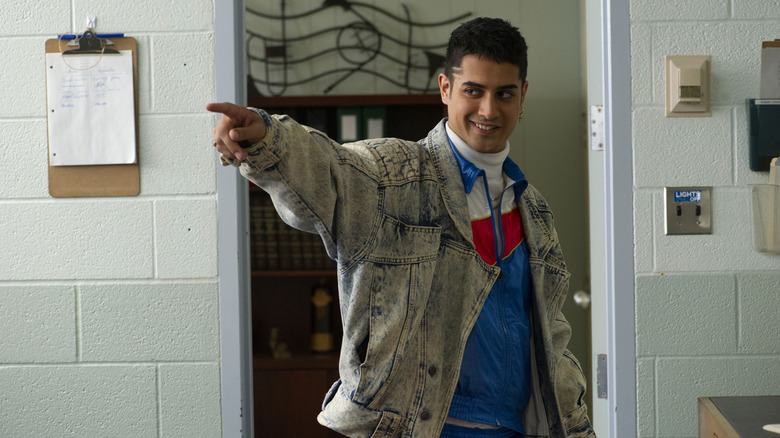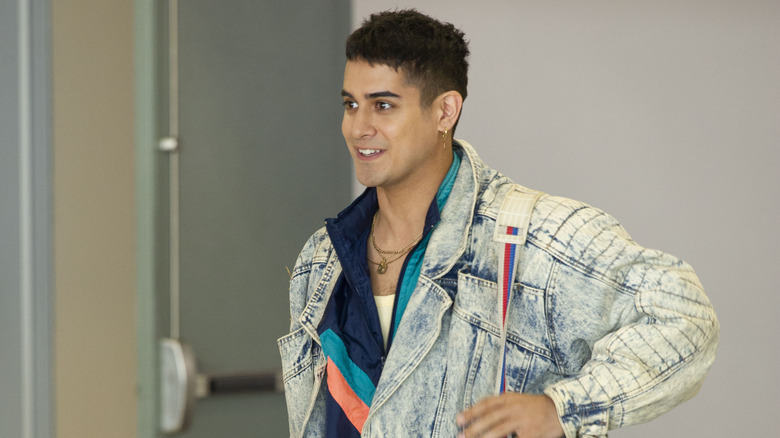Dan Mazer Talks His Brand New Film The Exchange And Reflects On His Work With Sacha Baron Cohen - Exclusive Interview
"The Exchange" takes place during the 1980s in a small Canadian town — so small that it doesn't even have a fast food joint. Tim (Ed Oxenbould) is an awkward teenager who'd rather watch art films than deal with his sports-obsessed dullard classmates. Hoping for some sophisticated company, he puts in an application for his family to host a French exchange student. He doesn't get the urbane intellectual he hopes for, though — instead, it's Stéphane (Avan Jogia), a spontaneous, sex-crazed, charisma factory who everyone in the town loves but him.
This coming of age comedy was written by Tim Long, a veteran of both "The Simpsons" and "The Late Show with David Letterman," and was directed by Dan Mazer. If that name sounds familiar, it's because he's been Sacha Baron Cohen's writing partner for around two decades. "The Exchange" is at once the opposite of "Borat Subsequent Moviefilm" and has some striking similarities — it's tightly scripted, but it also feels real and character-driven.
Looper spoke with Mazer in an exclusive interview. We discussed how a British man could direct an Australian (Oxenbould) in a Canadian story, Tim Long's script, and the long process of casting the right people. We also spoke about his work with Sacha Baron Cohen, and asked whether we should expect Ali G or Brüno to come back.
A cross-cultural Exchange
You're British, this is a Canadian story that involves a French aspect, and you're directing an Australian. How do you reconcile all that?
Well, I think it sort of speaks almost to the universality of the story, the fact that so many people from so many different places all responded to it, and identified with it, and were able to convey it in a way that hopefully resonated. Even though it is a very specific local story in the details, the devil is in the details of its specificity. What I loved about it is that it speaks to something that we all identify with — the feeling of being an outsider, the feeling of being isolated, the fact that wherever you are in the world and however old you are, when somebody else from somewhere else comes in, they seem odd as well. I think that spoke to me in the way that I grew up in a suburb of London and felt like an outsider, because I went to a school where I was the only person who was kind of creative and artistic. It was slightly frowned upon when the teacher would tell us to go away and write a story of the weekend.
I'd come back, everybody else seeing how little can we get away with, can we write three paragraphs? I come back with 20 pages, because I'd spend the entire thing ... Everybody else would sigh. Frankly, the teacher would be incredibly annoyed because they had to read 20 pages of my drivel. But the fact was, I was shunned and seen as different in the same way as Tim Long, the writer of this movie, was seen as different and shunned when he grew up. Tim, the character in the movie was shunned, and seen as different, and rejected by his schoolmates for being sensitive, and artistic, and in touch with his feelings. So I think that, as I said, is an entirely universal theme that spoke to all of us.
I can vouch for that, because I have a similar story. I was also a guy from a small town in New Jersey, who was a little more creative than a lot of people, liked artsy movies. But I also noticed something about Tim, which is that a bunch of his problems are kind of his own fault. He's stubborn, he kind of doesn't like going outside his comfort zone. Did you find anything about that yourself?
Well, I think there's also that thing where along with that kind of creativity comes a streak of arrogance. I think in a lot of people, there's the idea that somehow being different also makes us special in a weird way. I think that appealed to me, and I think that appeals to a lot of us, and we slightly play into that, some of us, and enjoy that idea of being l'étranger, the stranger, the outsider. I think actors, writers, creative people, that's also a source of their inspiration, and that's where they disappear to.
That's where they find themselves, and I think they enjoy some of that limelight, and I don't think anybody enjoys being bullied. But I do think that some of us enjoy being different, and want to emphasize that. So I think ultimately we're lucky enough to be able to, when we work in the creative arts, and you, and I, and whatever, we find our community eventually. We all come together, and enhance each other, and support each other. But I think all of us secretly imagine, in order to go into the world that we go into, slightly think that we are ... Different equals somehow special.
Ed Oxenbould is a 'phenomenon'
So tell me about Ed, because he's really good in this.
Oh my God, Ed is just a phenomenon. I mean, it's one of the things where the minute I met him, and I saw him, and I read for him, he was just Tim. He elevated it, because I think there's definitely a world in which Tim could be annoying, and weak, as the audience could have the same reaction to him as probably the people where he lived had the reaction for the real Tim. I had to find somebody who had an innate sort of fragility and relatability. Ed was all of that, and just seamlessly slipped into the character of Tim like you wouldn't believe. The minute he read for us, there was just an ease with which he played that, a charm with which he played a character that could easily veer into obnoxious and un-charming.
But he just brought an incredible kind of humanity to it. So I loved him, I'd never really seen ... I'd seen him do stuff before that was certainly kind of less overtly comedic. There's a real skill, obviously, to sort of being the straight man to Stéphane, played by Avan, and Tim is obviously the heart, and the center, and the fulcrum of the movie. But he does that without it ever seeming kind of boring, or stiff, or a stick in the mud. There's a certain lightness to how Ed acts and performs, and it was a joy to see his kind of comic abilities, and sensibilities, and urges. The more we filmed, the more he relaxed into it.
Casting Avan Jogia as Stéphane
You mentioned Avan, and Avan is just hilarious — the way he delivers lines is just so naturally funny. Tell me a little bit about him.
Well, thank you. Again, Avan has never really done anything quite so kind of overtly comedic. I mean, he was great in "Zombieland," but I saw that after I cast him. It's an odd story how we came across Avan. Stéphane was always going to be the challenge to find, our Stéphane, who had to be cool, funny, authentic. We looked literally around the world, I mean, we went to north Africa, we went to France, we looked in London, we looked in America, and it was a sort of six-month search. It was a weird thing where we'd find somebody who was charming and enigmatic, but not funny, or we'd find somebody who was funny, but not charming and enigmatic.
It's the old sort of dilemma you get often with a builder, which is often you can't find good, fast, and cheap. For Stéphane, we were looking for funny, charming, and authentic, and Avan had all of those. Where I found Avan, bizarrely, I was still racking my brains. We hadn't quite found our Stéphane after looking for quite a long time, finding good candidates, maybe sort of transcendently great. I remembered I'd met Avan, bizarrely, I'd made a film with his then-girlfriend, Zoey Deutch. Avan had come to visit the set and was just kind of ineffably all those things that Stéphane needed to be, which was kind of charming, funny, intelligent, obviously, ridiculously handsome as well. I just thought, "My goodness, I wonder whether he's around, and available, and can play the age that he needs to?" Got in touch with him.
He read the script, loved it. Again, immediately, he sort of came in, nailed it, and within two minutes, I was just like, "Yes, he found our Stéphane, it's fantastic." You could see a village falling in love with Avan, in the way that kind of the town fell in love with Stéphane. He's just completely kind of magnetic and adorable, and has this sort of ... Despite having everything going for him, obviously, it's sickening how funny he is, how clever he is, and how good-looking he is. He still has an incredible sort of modesty, and fragility, and relatability, and doesn't have any of this ... arrogance or obnoxiousness that frankly I would expect him to have, and I would have myself if I had all of his assets.
Comparing/contrasting Sacha Baron Cohen and the possibility of an Ali G or Brüno return
So this movie is very tightly scripted, and it's very tightly directed. You make good use of everything, but it's different than when you come from, and this is where I have to ask about Sacha Baron Cohen. Because that's what you're widely known for, what's the difference between doing a tight movie like this and doing the loose chaotic stuff that you do with Sacha Baron Cohen?
Well, I would say I think it's probably better to look at the similarities, really. Because, as you say, they look so incredibly different, and I think the similarities are that ... I think the stuff with Sacha and I think the stuff in "The Exchange," everything ... I'm a great believer in comedy coming out with character. I think that the characters that we've developed with Sacha, Sacha and I have developed Borat, Ali G, they're all, I think, despite being larger than life, very relatable, very authentic, and very real, and have backstories that I could tell you all about, and feel kind of three-dimensional, even though they're extreme, and the comedy comes out of that. I think exactly the same with "The Exchange," I think the comedy comes out of Tim Long's brilliant script where he's painted two fantastic central characters who are very three-dimensional, very developed. When you do that, jokes are easy, and they're also sort of believable.
So I think that's a triumph of Tim's work in terms of the script. Then secondarily, I think ... The one thing I think I know about is jokes, and humor, and funny, and making things funny. I'm lucky enough with Sacha to work with somebody who is just brilliantly, naturally hilarious and visionary. With Tim Long's script, I think, again, his lineage from "The Simpsons," and 20 years work on that, which is obviously the very apogee of comic achievement. I think with Sacha and with Tim, I've been lucky to have two amazing collaborators who are at the top of their game, and a just kind of Ivy League comedy brain. I think if you surround yourself with people like that, then that's half the battle.
None of us ever thought Borat would come back, and you made "Subsequent Moviefilm," which was one of my favorite films of the last year. Do you see a world in which Brüno or Ali G ever come back?
I mean, look, I would say it's difficult, I think, especially with those two. Because the world has changed so much in terms of comic sensibilities. I think the reason we brought Borat back was we felt like there was a definitive need for him in the world of Trump, and all that involved. We thought that putting him out there could do good, sway some people, point out some horrors within the system, in the world. There was a solid rationale for Borat's survival. So maybe if there was something similar that jolted us into believing that Brüno or Ali G need to be resuscitated, potentially. But I don't think we're thinking of that anytime soon.
I'm going to bring it all full circle with what I was asking before and what I'm asking now: Does Sacha Baron Cohen give you any advice when you're directing a movie or writing something that has nothing to do with him? Do you have an open mind with him?
I mean, he would, he's certainly never short of opinions or thoughts. But it's weird, I like to keep my worlds separate in a weird way. Sacha and I have known each other for nearly 40 years, and worked together solidly for nearly 25, or more, so there's something nice about just going off and doing things in a vacuum and totally different ... In the same way as he goes off and does some Sorkin stuff, and "Les Misérables," and those brilliant things. I think it's nice to have a little sabbatical from one another, as much as we respect and love each other, and his advice would be brilliant. I enjoy my independence.
"The Exchange" will be available on demand and digital on July 30.




